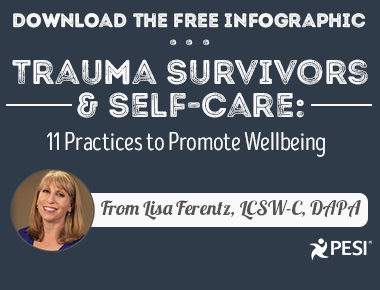Trauma Survivors and Self-Care
11 Practices to Promote Wellbeing

As a mental health practitioner, you may relate to the idea of giving your clients ‚Äúhomework assignments‚Äù throughout the course of therapy. Your intention might be to build a bridge of continuity between sessions, to highlight a new insight, help your client practice a new behavior, decrease isolation, or strengthen a positive thought that‚Äôs been re-framed from well-entrenched negative beliefs. If you work with clients who grew up with trauma, abuse, or neglect, you might agree that the most challenging assignment is anything that relates to practicing and enhancing self-care.¬ÝThis is partly because messages from childhood unfairly equated self-care with being ‚Äúselfish.‚Äù As a result, taking time to attend to their emotional or physical needs feels ‚Äúwrong.‚Äù It‚Äôs also hard to buy into the idea that they‚Äôre deserving of self-care when it wasn‚Äôt modeled or reinforced by loving, nurturing caretakers.
As you well know, despite distorted messages or a lack of good modeling, everyone needs to engage in self-care. Clients‚Äô energy levels, productivity, ability to be self-protective, their physical and mental wellbeing, sense of satisfaction in the workplace, and fulfillment in personal relationships are all impacted by the extent to which they do or don't engage in self-care.¬Ý
When I talk about self-care with clients, I define it as a conscious decision to think, feel, and behave in ways that promote wellbeing in all arenas; emotionally, mentally, physically, spiritually, and psychologically. It requires both an inward focus, so they can assess what they need at any given time, and then a commitment to act on those needs so they can ensure that they are met. It’s a willingness to sometimes put themselves first rather than constantly putting their needs to the side to take care of others.
However, for trauma survivors, childhood survival is often contingent upon focusing on the needs of others. Being hyper-vigilant, compliant, or accommodating is a way to stay safe. This is especially true when caretakers are narcissistic or abusive. The decision to focus on just oneself can feel counter-intuitive and uncomfortable. However, it’s important to teach clients that it feels weird because it’s new and unfamiliar—not because it’s wrong!
So how can you help your clients work on increasing acts of self-care? Keeping in mind that self-care can manifest in different ways, consider suggesting these 11 practices as "homework assignments" to promote wellbeing:
- Invite clients to reconnect with the soothing benefits of nature by taking a 15-minute walk or just lying in the grass and noticing their surroundings.
- Encourage clients to talk to themselves in front of the mirror, saying things that are positive and kind rather than critical or perfectionistic.
- Discuss concrete ways to slowly create a better work/life balance. They can start by committing to leaving work on time at least twice a week, rather than working overtime everyday.
- If their workplace is unsupportive or toxic, invite them to write up a description of what their ideal workplace would look and feel like, and then walk them through a guided imagery that allows them to visualize it.
- Invite clients to make healthy choices related to nutrition, exercise, adequate rest and sleep, and have them document their successes and then process them in session.
- Encourage clients to identify one concrete way to improve their medical or mental wellbeing and put it into practice.
- For one hour a day, ask clients to commit to powering down from digital technology and social media to reduce over-stimulation or emotional upset. Have them use that time for quiet contemplation, reading positive affirmations, strengthening a spiritual connection, or pursuing a mindfulness or meditation practice.
- Invite clients to brainstorm about reducing social isolation by connecting face to face with people they love and care about. Ask clients to revisit boundaries in relationships with people who are crisis-driven, overly demanding, or unsupportive.
- Suggest that clients give themselves the gift of spending time with a baby or a pet.¬ÝIt‚Äôs the most unconditional affection they can get!
- Invite clients to put aside prescribed time to journal or draw. This will increase an inward focus, help them process thoughts and emotions, and strengthen their creative side.
- Encourage clients to take time, everyday, to do something that brings them joy or makes them laugh.
Although it can take time for acts of self-care to resonant and become second nature, the best way for our clients to get there is through practice and repetition. Doing things that feel loving and nurturing, and talking to themselves in ways that are supportive and positive, are inherently reinforcing because they feel good! In time, it will become easier and more natural to take care of themselves than it will to mistreat themselves or ignore their basic needs. For people who have grown up with trauma, abuse, or neglect, re-claiming the right to be treated with love and respect is an important part of the healing process.¬ÝIt‚Äôs empowering to discover that despite a history of pain, it‚Äôs never too late to learn how to engage in self-care. The positive ripple effects will translate into every aspect of life, profoundly enhancing a sense of wellbeing, inner peace, and self-worth. And no one deserve less than that.
Topic: Trauma
Tags: Posttraumatic Stress Disorder (PTSD) | Shame | Toxic Stress | Trauma Treatment


